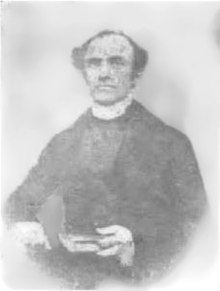Enrico Tazzoli (priest)
| Enrico Tazzoli | |
|---|---|

Photograph of Tazzoli taken around 1850
|
|
| Born |
19 April 1812 Canneto sull'Oglio |
| Died | 7 December 1852 (aged 40) Mantova |
| Nationality | Italian |
| Occupation | Priest |
| Known for | Belfiore Martyr |
Enrico Tazzoli (19 April 1812 - 7 December 1852) was an Italian patriot and priest, the best known of the Belfiore martyrs.
Enrico Tazzoli was born in Canneto sull'Oglio on 19 April 1812, son of Pietro Tazzoli, justice of the peace and magistrate, and Isabella Arrivabene, of a noble family. His given names were Enrico Napoleone. In 1821 he was enrolled in the second class of the Goito secondary school, where he immediately began to show his inclination for the priestly life. Later he entered the seminary in Verona. He was ordained on 19 April 1835 by the bishop of Verona, since the Mantuan seat was vacant after the death of Giuseppe Maria Bozzi. In 1844 he published the "Book of the people" which denounced social inequality. Tazzoli became a professor of philosophy at the seminary of Mantua, and taught school. He was never a pastor. He lived with his mother near Mantua Cathedral in the Zuccaro district.
Tazzoli was arrested the first time on 12 November 1848 for giving a sermon in Duomo against the tyrannical imperial powers who allowed the sack of Mantua of 1630, evidently an allusion to the imperial Austrians of his time. The arrest was ordered by the Captain Carl Pichler von Deeben, the same man who ordered Ugo Bassi shot in Bologna in 1849, and who in 1851 ordered the same fate for Giovanni Grioli. For the moment, however, the arrest was done only as a warning. In a search of the house he turned a blind eye to the tricolor scarf that was found among the books, but warned the priest's mother to burn the 5 giornate (5 days) of Ignazio Cantù and the poems of Giovanni Berchet. Don Enrico was then released, and on returning home found a large crowd applauding his courage and ideas.
While Tazzoli did not share the religious vision of Giuseppe Mazzini, he became convinced that his Young Italy movement was the only one that had the membership and organization needed to take concrete action. Very involved in Catholic philanthropy and popular education, he married the "enlightened" principles of his Christianity with the humanitarian and "democratic" spirit of the Risorgimento to define his supreme love of country, his second religion.
...
Wikipedia
